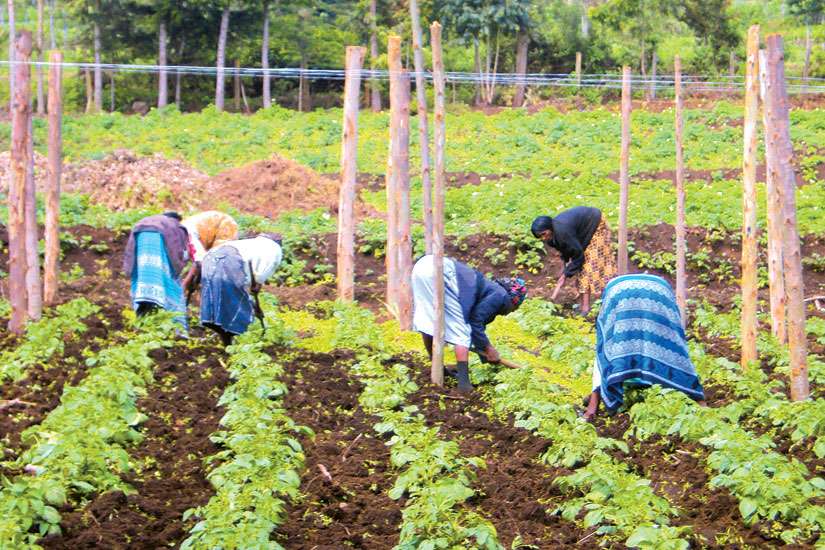In Kenya, Chalice has launched a program that gathers small groups of people into support communities where they can learn to farm better and receive outside help to put what they learn into action.
The program is called eRoots. It provides resources and training to help communities grow their own food and develop sustainable small farms. So far in Kenya, 165 “community development groups” have been helped, which translates into about 9,600 people working towards self-reliance. The poor and marginal farmers, mostly women, who have joined eRoots community development groups can call upon the expertise and support of some of the best agricultural research and practices in the world.
Chalice employs community organizers with degrees in agronomy and agriculture. The Chalice eRoots team in turn has the support of major international players in agriculture — Bioversity International, the International Centre for Maize Breeding and the World Agroforestry Centre — plus Kenya’s Ministry of Agriculture and its associated agencies and institutions.
The idea is to give poor, small farmers with little or no land a leg up.
But it begins with small groups of local people meeting regularly, setting their own goals, supporting one another and focusing on growing more and better food.
“We have this progression of eRoots that is trying to build self-reliance,” Cosgrove told The Catholic Register. “We focus on each family becoming more secure in their life. So you do that and you create better livelihood opportunities.”
It starts with food because food is so basic to who we are, said Cosgrove.
“It’s tangible. It’s basic. When you’re talking to people they first want to say they want their immediate needs dealt with,” Cosgrove said. “When you’re in poverty, you have to start there. You can’t do anything unless you start there.”
Gathering together for and because of food is a constant pattern of all human societies. It’s also essential to our eucharistic, Gospel faith, said Cosgrove. It’s what we mean by Communion.
“A community of mutual support is foundational,” Cosgrove said. “We often talk about the Last Supper, but obviously that presupposes a first supper and many more in between — those meals of communion that were made holy by the presence of God in Christ Jesus.”
By helping Kenyan farmers come together to support each other and grow their own food, Chalice is extending Jesus’ conception of a meal and a gathering of disciples into our world today, said Cosgrove.
“For us, when we talk about the small groups, they always begin with praise, they always begin with prayer,” he said.
In 1986, Cosgrove didn’t start off with such ambitious objectives. Watching late-night television, he was moved to sponsor a child. He found himself phoning an Evangelical charity, and that made him mad.
“I got enraged. I got angry. I thought, why are we not doing this? Why can I not sponsor a child in my own Church?”
Since then Chalice has pioneered a method of direct family funding that does much more than fill gaps, buying school uniforms and other handouts.
“It’s an old adage, you know — ‘if you teach a person to fish’ etc.” Cosgrove said. “It’s an old adage, but it’s often not done. It’s just not done because it’s difficult to do.”
Chalice has grown into a mid-level Canadian development player that disbursed $19.8 million around the world in the year ending June 30 this year. But its real aim is to extend Communion from Canada, beginning with the poor.
“Bringing Christ to the poor, sharing Christ with the poor and bringing the poor to Christ,” Cosgrove said.
“That’s very much the Church in action.”


